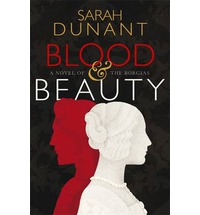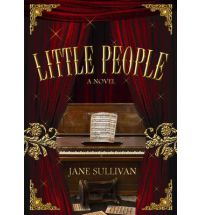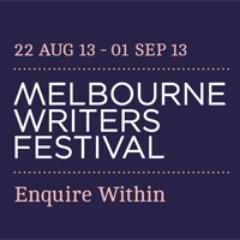 The Melbourne Writers Festival has started and I’ve already make the trek into Melbourne twice (and will go again today) for events. On Friday 23rd I went to see Australian author Peter Goldsworthy. I’ve read Three Dog Night and a collection of his short stories and he recently released a memoir entitled My Stupid Boyhood. I mostly went to this event with the intention of buying the memoir and getting it signed for my husband to give to him on Father’s Day. I enjoyed this session a lot (but I didn’t take any notes because it was mostly just him talking about bits and pieces of his life). In fact I enjoyed it so much that I think I might borrow the memoir from my husband. Probably before he even has a chance to read it.
The Melbourne Writers Festival has started and I’ve already make the trek into Melbourne twice (and will go again today) for events. On Friday 23rd I went to see Australian author Peter Goldsworthy. I’ve read Three Dog Night and a collection of his short stories and he recently released a memoir entitled My Stupid Boyhood. I mostly went to this event with the intention of buying the memoir and getting it signed for my husband to give to him on Father’s Day. I enjoyed this session a lot (but I didn’t take any notes because it was mostly just him talking about bits and pieces of his life). In fact I enjoyed it so much that I think I might borrow the memoir from my husband. Probably before he even has a chance to read it.
On Saturday I met up with Marg from Adventures from an Intrepid Reader at the train station and we caught the train in nice and early to go to the Morning Reads session in Beer DeLuxe. We ordered hot chocolates and sat back to listen to four authors reading from their books.
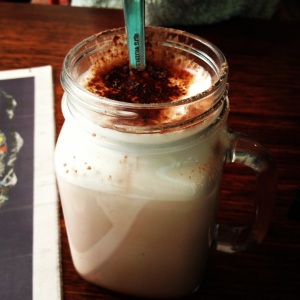 My hot chocolate – it came in a snazzy little jar.
My hot chocolate – it came in a snazzy little jar.
The four authors reading from their work were Ali Cobby Eckerman, Sarah Turnbull, Jesse Blackadder (who I would also be seeing in another session later on that day) and Teju Cole. I came away from the Morning Read with three new titles to add to my TBR. The MWF is so dangerous for my TBR!
After that we had a quick half hour break and then headed to History’s Script featuring Sarah Dunant and Jane Sullivan, neither of whom I’ve read before. Historical fiction is not something I read a lot of until recently but it’s something that interests me more and more. I’m so glad I went to this session because it was fascinating. It was recorded as an episode of Books & Arts Daily with Michael Cathcart on the ABC so if you listen to or podcast that show, keep an eye out for this one which I think will air Tuesday 27th. It’s awesome.
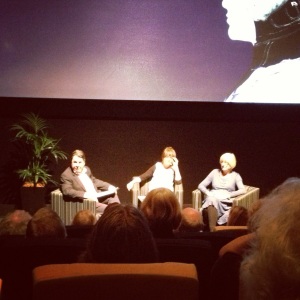 So the show began with the host introducing Sarah Dunant, whose latest book is Blood & Beauty and dives into the infamous Borgia family during Renaissance Italy and Jane Sullivan. Her latest book, Little People explores some little people living in Melbourne and performing during the 1800s.
So the show began with the host introducing Sarah Dunant, whose latest book is Blood & Beauty and dives into the infamous Borgia family during Renaissance Italy and Jane Sullivan. Her latest book, Little People explores some little people living in Melbourne and performing during the 1800s.
Sarah Dunant studied history at Cambridge and read a lot of historical fiction. She grew up in post-war Britain where everything was grey and drab and not terribly exciting. Historical fiction was, for her, colourful and romantic, an escape. Studying history did have the effect of kind of beating the romance out of the history! She believes that men are more likely to come to historical fiction from either “Marxism or books about battles”. She didn’t study the Renaissance period at university but in 2000 she was living in Florence which is so rich with past and history that she couldn’t ignore it. They are immensely proud of their art and it’s kind of hard to ignore.
In contrast, Jane is/was not a historian. She didn’t study history beyond high school but she remembers the pictures in history texts. Instead she studied literature at university and came to history through that, particularly the 19th century. She moved to Australia in the 1970’s and was struck by the cities like Melbourne and the goldrush cities and how they were when they were new. Melbourne is the “Chicago of the South” a description that she finds apt. She identifies with Melbourne and the buildings and the stories. She feels there’s an enormous sense of history here. Someone brought up Sir Redmond Barry, who is perhaps known for hanging Ned Kelly but he was also a great driving, civilising force. Sullivan said he’s not in Little People but he might perhaps pop up in her next novel.
Little People deals with four little people in Melbourne who traveled around, performing simply because of their tiny stature. They were treated almost like rock stars. Sarah Dunant mentioned that there is a fascination with what used to be referred to as “the freak”. Both Dunant and Sullivan have encountered dwarves or little people. Dunant found that courtesans often kept them as exotic pets. They were not feared or marginalised, more celebrated.
The question was brought up: what does fiction allow you to do?
Jane Sullivan: There was limited information on the little people – she knew that they existed but not much about their actual personalities, upbringing etc. The history was constructed and controlled by P.T Barnum who created and crafted personalities. She didn’t know what they were really like which meant she got to make it up and also invent characters as well. She did use real people and real venue/travels in her story but she was also given freedom to invent.
Sarah Dunant: She comes first from history to fiction. The Renaissance is unbelievably rich and complex and highlights the big difference between 100 years ago and 500 years ago. People think and behave differently during different times and she had to think about that. You can find hidden bits of history such as what women did at certain times, but not full stories. She puts the soil in place with scene and politics and then makes the characters out of that.
Blood and Beauty deals with the Borgias and what she discovered when she was doing her research is that what we think we know is not all true because there was so much about the family that came to light by way of scandal, whispering, rumours, etc. What you think is history can sometimes not be. There was some talk of Cesare Borgia and how in today’s terms he’d be defined as a sociopath. He was extremely intelligent with the ability to be charming when he wanted but lacked empathy. Lucrezia in particular got some bad press and was lambasted in history. Dunant declared that “everyone loves an evil woman”. Dunant said part of writing historical fiction is discovering that what we know is wrong. She is looking at “spin” and “tabloid journalism” that existed even 500 years ago.
History is an argument supported by ethics. Sarah Dunant said that a good historical novelist uses stories – to be true to what we know to be the grand narratives and bring them to life through story. Jane Sullivan says that we think of history as progress but things go up and down. There can be things that happened 500 years ago that we can still relate to in the modern world (the reference she used was war because of religion) and there are things that we can’t relate to because times have changed.
Historians fall into 2 groups – they either believe history is like us or not like us. The good ones can write about both! Sarah Dunant: You can find what’s in the present by sinking yourself into the past.
Question: Is fantasy displacing historical fiction?
Sarah Dunant answered that genres blur, which Game of Thrones has done exceptionally well. Dunant then went on to say what she doesn’t like is fiction that pretends not to be, such as the television series of The Borgias that recently aired. It’s not made clear that it’s fiction. She says there’s a “new genre” which is 50 minutes of TV with lots of sex, torture etc. She thinks that you don’t need to make it up, the truth is interesting enough but this does create a conversation of how we want to learn our history. The TV series does have a purpose – it makes people want to learn more.
The host, Michael Cathcart brought up that when he reads historical fiction (he cited Peter Carey’s The True History of the Kelly Gang) he often becomes frustrated at how you know what is real and what is made up. This is something I’ve often wondered myself, particularly since I began reviewing. It’s nice to know what is real and what is not. As Jane Sullivan said, in a perfect world, there would always be an Afterword that tells you this, nice and neat. Some authors however don’t do this.
There was some chat about the difference between male and female readers: men are more likely to read factual, women more likely to read fiction. Men tend to feel safer with fact than emotion but many more men are gaining interest in historical fiction. Have men changed? Or has the fiction?
Jane Sullivan credits Hilary Mantel with some responsibility for this. She writes “respectable” fiction that men don’t feel uncomfortable reading. There’s a misconception about historical fiction, that it’s historical romance (which is a whole other genre). According to Sarah Dunant, history has changed so historical fiction has to. History is just too important to be ignored.
Jane Sullivan: you can write about anything now, not just famous Kings and Queens (ie no more imagined stories of Anne Boleyn please!).
Question: Do you have any advice for anyone writing historical fiction?
Sarah Dunant: Don’t!
Jane Sullivan: She didn’t intend to write a historical fiction novel, just a novel about the people. In research, you read things that inspire you. Don’t underestimate it – it’s a huge undertaking. But if you’re inspired, just do it.
Sarah Dunant: Within the writing, there is a huge amount of pain.
This session was absolutely fabulous. Both Dunant and Sullivan were amazing speakers and really sold me on their passion and enthusiasm. Blood & Beauty has rocketed to the top of my ‘books I must acquire soon’ list.
I have to read this. I’ve read a couple of books on the Borgia’s before, most of which capitalised on the rumours of incest etc surrounding Lucrezia, her father and her brother Cesare. I’m interested to see what Dunant’s take on it is and how she came across information that supports the theory that the family wasn’t quite as salacious as they seemed (but still some – the Pope did have 3 kids after all!).
I was going to include my other session in this wrap up but it’s getting a bit long here so I might leave that for another time.
